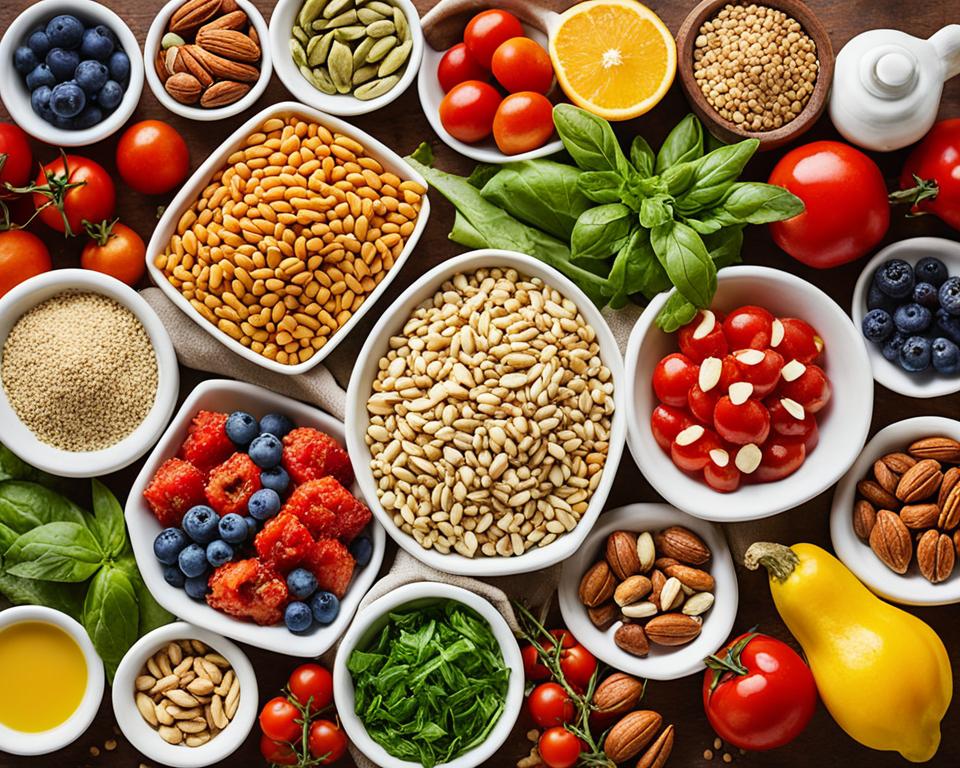The Mediterranean diet is a popular and highly regarded eating pattern that promotes good health and delicious cuisine. With its emphasis on fresh fruits, vegetables, whole grains, lean proteins, and healthy fats, it has been consistently ranked as one of the best diets to follow for overall well-being.
Are you looking for easy Mediterranean dishes and meal ideas to incorporate into your diet? In this article, we will explore the Mediterranean diet plan, its benefits, guidelines, and provide you with a variety of mouthwatering Mediterranean diet recipes to try at home.
Key Takeaways:
- The Mediterranean diet is a flavorful and well-balanced eating pattern that focuses on whole, unprocessed foods.
- Following the Mediterranean diet can promote heart health, aid in weight management, reduce inflammation, and prevent chronic diseases.
- The guidelines for the Mediterranean diet emphasize the consumption of fruits, vegetables, whole grains, lean proteins, and healthy fats like olive oil, while limiting processed foods and sweets.
- Some delicious Mediterranean meal ideas include sheet pan eggs and veggies, Greek salad, roasted cauliflower with lemon and cumin, and salmon fish sticks.
- Vegetarian and vegan individuals can also enjoy the Mediterranean diet by incorporating legumes, pasta, grains, and fresh herbs into their meals.
What is the Mediterranean Diet?
The Mediterranean diet is not a restrictive or structured diet, but rather a way of eating that is based on the traditional foods and eating patterns of the Mediterranean region. It emphasizes the consumption of fruits, vegetables, whole grains, lean proteins, and healthy fats like olive oil. The focus is on a well-balanced approach to healthy eating that combines flavor, nutrition, and the pleasure of the table.
The Mediterranean diet is rooted in the traditional foods that have been consumed for centuries in countries like Italy, Greece, Spain, and Morocco. With a strong emphasis on fresh, whole foods, this eating pattern promotes a sense of balance and enjoyment when it comes to meals. It celebrates the flavors and ingredients found in the Mediterranean region, offering a diverse and delicious approach to healthy eating.
“The Mediterranean diet is not just about the type of foods you eat, but also about the way you eat them. It encourages a slower pace, enjoying meals with family and friends, and savoring the flavors and textures of the food.”
Mediterranean meals are typically well-balanced, incorporating a variety of food groups into each dish. Fruits, vegetables, whole grains, legumes, and nuts form the foundation of the diet, providing essential vitamins, minerals, and fiber. Lean proteins, such as fish, poultry, and dairy, are also included in moderation. Healthy fats, particularly olive oil, are used as a primary source of fat, adding flavor and nutritional benefits.
In addition to the nutritional aspects, the Mediterranean diet also places importance on the social and cultural aspects of food. Eating meals together, sharing food, and enjoying the pleasure of the table are all integral parts of this eating pattern. It promotes a holistic approach to well-being, recognizing that food is not only a source of nourishment but also a means of connection and enjoyment.
The Key Elements of the Mediterranean Diet
- Abundance of fruits and vegetables
- Inclusion of whole grains
- Focus on lean proteins
- Healthy fats, particularly olive oil, as a primary source of fat
- Moderate consumption of dairy and poultry
- Limiting consumption of red meat and processed foods
- Enjoyment of meals with family and friends
- Savoring the flavors and pleasure of the table
The Mediterranean diet offers a sustainable and enjoyable approach to healthy eating that can be easily incorporated into different lifestyles and cultural preferences. By embracing the traditional foods and eating patterns of the Mediterranean region, individuals can achieve a well-balanced and flavorful way of nourishing their bodies while also enhancing their overall well-being.
Benefits of the Mediterranean Diet
The Mediterranean diet is renowned for its numerous health benefits. By embracing this heart-healthy eating pattern, individuals can effectively manage their weight, reduce inflammation, and prevent chronic diseases. Studies have indicated that following the Mediterranean diet is associated with a longer lifespan and improved overall well-being.
One of the key advantages of the Mediterranean diet is its positive impact on heart health. The consumption of nutrient-rich foods, such as fruits, vegetables, whole grains, and healthy fats, contributes to lower levels of cholesterol and blood pressure, reducing the risk of cardiovascular diseases.
Another significant benefit of the Mediterranean diet is its potential for weight management. The emphasis on whole, unprocessed foods and a balanced approach to eating can help individuals achieve and maintain a healthy weight. The inclusion of lean proteins, such as fish and poultry, and the limited consumption of red meat and sweets further support healthy weight management.
In addition, the Mediterranean diet is known for its inflammation-reducing properties. The abundance of anti-inflammatory foods, including fruits, vegetables, nuts, and olive oil, can help alleviate chronic inflammation in the body. By reducing inflammation, the Mediterranean diet may protect against various chronic diseases, including diabetes, certain types of cancer, and other inflammatory conditions.
“The Mediterranean diet offers a delicious and nutritious way of eating that promotes a healthy lifestyle and overall well-being.”
Furthermore, the Mediterranean diet has been associated with a decreased risk of developing chronic diseases. Its nutrient-dense composition provides the body with essential vitamins, minerals, and antioxidants, which play a vital role in preventing the onset of various health conditions. By following the Mediterranean diet, individuals can significantly reduce their risk of developing chronic diseases and improve their overall health.
It is also worth noting that the Mediterranean diet is not just about the physical benefits; it also contributes to improved mental well-being. The social aspect of sharing meals and the overall enjoyment of delicious, flavorful foods can enhance one’s quality of life and promote a positive relationship with food.
By adopting the Mediterranean diet, individuals can experience a range of significant health benefits, from promoting heart health and weight management to reducing inflammation and preventing chronic diseases. With its emphasis on fresh, wholesome ingredients and balanced eating patterns, the Mediterranean diet offers a holistic approach to well-being that is both satisfying and sustainable.
Guidelines for Following the Mediterranean Diet
The Mediterranean diet is not just a diet but a way of life that promotes healthy eating patterns and overall well-being. Here are some guidelines to help you embrace this eating style:
- Emphasize whole foods: The Mediterranean diet prioritizes the consumption of whole, unprocessed foods. Fill your plate with an abundance of fresh fruits, vegetables, whole grains, legumes, and nuts. These nutrient-dense foods provide essential vitamins, minerals, and fiber for optimal health.
- Adopt a plant-based approach: Make plants the star of your meals. Incorporate a variety of colorful fruits and vegetables into your daily diet. They are rich in antioxidants, which can help protect against chronic diseases. Aim to have at least half of your plate filled with plant-based foods.
- Use olive oil as your primary fat: Olive oil is a cornerstone of the Mediterranean diet. It is rich in monounsaturated fats, which are heart-healthy and anti-inflammatory. Use olive oil as your primary cooking fat and as a dressing for salads and vegetables.
- Enjoy moderate amounts of fish, poultry, and dairy: The Mediterranean diet includes moderate consumption of fish, poultry, and dairy products. These lean protein sources provide essential nutrients such as omega-3 fatty acids, calcium, and vitamin D. Opt for grilled or baked fish, skinless poultry, and low-fat dairy options.
- Limited red meat and sweets: Red meat and sweets are limited in the Mediterranean diet. Red meat is high in saturated fats, which can increase the risk of heart disease. Sweets, such as desserts and sugary beverages, should be enjoyed in moderation to avoid excessive sugar intake.
- Avoid processed and packaged foods: Processed and packaged foods are discouraged in the Mediterranean diet. These foods are often high in added sugars, unhealthy fats, and sodium. Opt for fresh, whole foods whenever possible to maximize nutritional benefits.
- Moderate wine consumption: Moderate wine consumption is a characteristic of the Mediterranean lifestyle. Red wine, in particular, contains antioxidants that may have heart-protective effects when consumed in moderation. Enjoy a glass of wine with meals, but remember to drink responsibly.
Following these guidelines will help you adopt a Mediterranean eating style that supports your health and well-being. By focusing on whole foods, incorporating plant-based ingredients, and limiting processed foods, you can enjoy the benefits of this balanced and delicious way of eating.
Mediterranean Diet Food List
Following the Mediterranean diet means incorporating a wide array of wholesome and nutritious foods into your meals. Here is a comprehensive list of foods that are typically included in the Mediterranean diet:
Fruits and Vegetables
- Fresh fruits such as apples, oranges, grapes, and berries
- Leafy green vegetables like spinach, kale, and arugula
- Colorful vegetables such as tomatoes, peppers, and eggplants
- Crunchy vegetables like cucumbers, carrots, and celery
Whole Grains
- Whole wheat bread and pasta
- Brown rice
- Quinoa
- Oats
Legumes
- Chickpeas
- Black beans
- Lentils
- Kidney beans
Nuts and Seeds
- Almonds
- Walnuts
- Sunflower seeds
- Chia seeds
Olive Oil
Extra-virgin olive oil is the primary source of fat in the Mediterranean diet. It is packed with antioxidants and healthy monounsaturated fats.
Fish and Seafood
Include fatty fish like salmon, tuna, sardines, and mackerel in your diet. These fish are rich in omega-3 fatty acids, which promote heart health.
Poultry and Dairy
Moderate amounts of lean poultry, such as chicken and turkey, can be enjoyed. Dairy products like Greek yogurt and cheese can also be included in moderation.
Red Meat, Sweets, and Processed Foods
Red meat, sweets, and processed foods should be consumed sparingly in the Mediterranean diet. These foods are typically limited to occasional indulgences.

The Mediterranean diet focuses on a wide range of nutrient-dense foods that nourish the body and support overall health. By incorporating these foods into your daily meals, you can enjoy a balanced and delicious diet that promotes well-being.
Mediterranean Diet Meal Ideas
Looking for delicious meal ideas that fit the Mediterranean diet? We’ve got you covered. Whether you’re in need of breakfast, lunch, dinner, or snack options, these Mediterranean-inspired recipes are packed with flavor and nutrition. Plus, we’ll share some meal prep tips to help you stay on track. Let’s dive in!
Breakfast
Start your day with a nutritious and fulfilling Mediterranean-inspired breakfast. Here are a few ideas to kickstart your morning:
- Sheet Pan Eggs and Veggies: A quick and easy breakfast option that combines eggs, colorful vegetables, and aromatic herbs.
- Hummus Toast: Top whole grain toast with creamy hummus, sliced tomatoes, cucumbers, and a sprinkle of fresh herbs.
- Breakfast Egg Muffins: Make-ahead egg muffins loaded with vegetables and herbs, perfect for busy mornings.
- Foul Mudammas: A traditional Middle Eastern breakfast dish made with fava beans, tomatoes, onions, and spices.
- Tahini Banana Shake: Blend together ripe bananas, tahini, Greek yogurt, honey, and a dash of cinnamon for a creamy and nutritious shake.
Lunch and Dinner
For lunch and dinner, the Mediterranean diet offers a wide range of delicious options. Here are a few recipes to tantalize your taste buds:
- Shakshuka: A flavorful one-pan dish made with poached eggs simmered in a spiced tomato and bell pepper sauce.
- Greek Salad: A refreshing salad that features crisp cucumbers, ripe tomatoes, red onions, Kalamata olives, and feta cheese.
- Roasted Cauliflower with Lemon and Cumin: A simple yet flavorful dish that combines roasted cauliflower florets with tangy lemon and aromatic cumin.
- Watermelon Salad: A light and refreshing salad that pairs juicy watermelon with creamy feta cheese, mint, and a balsamic glaze drizzle.
- Salmon Fish Sticks: Crispy oven-baked salmon sticks coated in a flavorful breadcrumb mixture, perfect for a quick and wholesome dinner.
Snacks
Enjoy healthy and satisfying snacks that align with the Mediterranean diet. Here are a few options to keep you fueled throughout the day:
- Cucumber and Tomato Salad: A refreshing salad made with crisp cucumbers, juicy tomatoes, red onions, and a lemony herb dressing.
- Roasted Tomatoes with Thyme and Feta: Sweet roasted cherry tomatoes topped with crumbled feta and fragrant thyme.
- Loaded Chickpea Salad: A protein-packed salad featuring chickpeas, diced vegetables, fresh herbs, and a lemon tahini dressing.
To stay on track with the Mediterranean diet, meal prepping can be a game-changer. Set aside some time each week to prep your meals, portion them out, and store them in convenient containers. This will save you time and ensure that you always have healthy Mediterranean meals at your fingertips.
With these Mediterranean diet meal ideas, you’ll never feel deprived or bored with your food choices. Embrace the flavors of the Mediterranean and enjoy the benefits of a balanced and wholesome eating plan.
Vegetarian and Vegan Mediterranean Recipes
The Mediterranean diet is not only suitable for meat lovers, but it is also highly adaptable for those following a vegetarian or vegan diet. With a wide variety of plant-based ingredients, you can create delicious and nutritious vegetarian and vegan Mediterranean recipes that showcase the flavors and vibrancy of this cuisine.
Legume Delights
Legumes, such as beans and lentils, take center stage in vegetarian and vegan Mediterranean recipes. These protein-packed powerhouses not only provide essential nutrients but also add a satisfying and hearty element to your meals. From creamy hummus and fragrant lentil soups to flavorful chickpea stews and satisfying bean salads, legumes offer endless possibilities for creating fulfilling and delicious dishes.
Pasta and Grains Galore
Pasta and grains, especially whole wheat varieties, play a significant role in vegetarian and vegan Mediterranean recipes. You can create mouthwatering pasta dishes like spaghetti aglio e olio, vibrant Mediterranean vegetable pasta, or comforting whole wheat couscous with roasted vegetables. Additionally, hearty grain-based salads and pilafs using quinoa, bulgur, or farro make for satisfying and wholesome meals.
Spices and Fresh Herbs
One of the hallmarks of Mediterranean cuisine is the generous use of fresh herbs and spices to enhance flavors. Experiment with aromatic herbs like basil, rosemary, thyme, and oregano to infuse your dishes with a burst of freshness. Don’t shy away from spices like cumin, paprika, and cinnamon, which add depth and complexity to your vegetarian and vegan Mediterranean recipes.
Infused with Olive Oil
Olive oil is the lifeblood of the Mediterranean diet, and it takes center stage in vegetarian and vegan Mediterranean recipes. Use it generously in dressings, marinades, and sautés to add richness and flavor to your dishes. Opt for extra virgin olive oil for its distinct flavor and numerous health benefits.
Incorporating these key elements into your vegetarian and vegan Mediterranean recipes will ensure that you create dishes that are nutritious, flavorful, and enjoyable. Let your culinary creativity flow as you combine legumes, pasta, grains, olive oil, fresh herbs, and spices to tantalize your taste buds and nourish your body.
Mediterranean Diet Recipes with Fish
The Mediterranean diet promotes the consumption of fish and seafood as excellent sources of lean protein. Incorporating fish into your meals not only adds variety but also provides essential nutrients, including omega-3 fatty acids that are beneficial for heart health and overall well-being.
Here are some delicious Mediterranean diet recipes featuring fish:
1. Salmon Soup
This comforting soup combines the flavors of salmon, vegetables, and aromatic herbs. It’s packed with vitamins, minerals, and omega-3 fatty acids, making it a nutritious choice for a light yet satisfying meal.
2. Mediterranean Tuna Salad Sandwiches
This refreshing and protein-packed sandwich features a medley of Mediterranean flavors. It combines flaky tuna, crisp vegetables, tangy olives, and creamy Greek yogurt dressing on whole wheat bread.
3. Salmon Burgers
These flavorful and juicy salmon burgers are a healthier alternative to traditional beef burgers. They are seasoned with herbs and spices, pan-seared to perfection, and served on a whole grain bun with a side of colorful salad.
4. Moroccan Vegetable Tagine with Fish
This exotic dish combines delicate white fish with a flavorful blend of spices, vegetables, and aromatic herbs. It’s slow-cooked to allow the flavors to meld together, resulting in a rich and aromatic stew.
By incorporating these Mediterranean diet recipes with fish into your meal plan, you can enjoy the benefits of lean proteins and omega-3 fatty acids while savoring the delicious flavors of Mediterranean cuisine.
| Recipe | Description |
|---|---|
| Salmon Soup | A comforting soup packed with salmon, vegetables, and aromatic herbs. |
| Mediterranean Tuna Salad Sandwiches | A refreshing sandwich featuring flaky tuna, crisp vegetables, and tangy olives. |
| Salmon Burgers | Flavorful and juicy burgers made from salmon, seasoned with herbs and spices. |
| Moroccan Vegetable Tagine with Fish | An exotic stew combining white fish with a flavorful blend of spices, vegetables, and aromatic herbs. |
Mediterranean Chicken Recipes and More
Chicken and other poultry are included in moderation in the Mediterranean diet. These lean proteins are a delicious and nutritious addition to a flavor-packed Mediterranean meal. The use of spices and herbs in Mediterranean cuisine adds depth and aroma to chicken dishes, making them a favorite among food enthusiasts. Try these Mediterranean chicken recipes that showcase the vibrant flavors of the Mediterranean:
1. Chicken Shawarma Pitas
Enjoy the rich flavors of Middle Eastern cuisine with this tasty and satisfying dish. Marinated chicken is grilled to perfection and served in warm pita bread with fresh vegetables, tangy tzatziki sauce, and a sprinkle of sumac.
2. Chicken Piccata
This classic Italian recipe is given a Mediterranean twist with the addition of lemon, capers, and olives. Pan-seared chicken breasts are cooked in a flavorful sauce and served with a side of roasted vegetables or a refreshing salad.
3. Braised Eggplant with Chickpeas
Indulge in the earthy flavors of eggplant and chickpeas in this hearty and satisfying dish. Tender chicken thighs are simmered with eggplant, chickpeas, tomatoes, and a wonderful blend of spices to create a wholesome and comforting meal.
| Recipe Name | Description |
|---|---|
| Chicken Shawarma Pitas | Marinated grilled chicken served in warm pita bread with fresh vegetables and tzatziki sauce |
| Chicken Piccata | Pan-seared chicken breasts cooked in a lemony sauce with capers and olives |
| Braised Eggplant with Chickpeas | Chicken thighs simmered with eggplant, chickpeas, tomatoes, and a blend of spices |
These Mediterranean chicken recipes are just a taste of the diverse and flavorful options available within the Mediterranean diet. With the use of aromatic spices and herbs, you can create dishes that are not only delicious but also packed with healthy nutrients. Get creative in the kitchen and explore the wonderful world of Mediterranean cuisine!

How to Build Delicious Mediterranean Bowls
Mediterranean bowls are a popular and versatile option for enjoying a nutritious and satisfying meal. By choosing your own ingredients, you can tailor your bowl to your personal preferences and dietary needs. Here’s a step-by-step guide to building a delicious Mediterranean bowl:
1. Start with a Base of Whole Grains
Begin your Mediterranean bowl by selecting a base of whole grains like quinoa or brown rice. These grains provide a nutritious foundation and are a great source of fiber and essential nutrients.
2. Add a Source of Protein
Next, add a protein component to your bowl. Options include grilled chicken, chickpeas, or even falafel for a vegetarian or vegan twist. Protein is vital for muscle repair and growth, promoting satiety, and providing sustained energy throughout the day.
3. Top with a Variety of Vegetables
Enhance the nutritional value and flavor of your Mediterranean bowl by adding a colorful assortment of vegetables. Consider including leafy greens, cucumbers, tomatoes, bell peppers, olives, and onions. These vegetables provide essential vitamins, minerals, and antioxidants.
4. Finish with a Flavorful Sauce or Dressing
Amp up the taste of your Mediterranean bowl by drizzling it with a delicious sauce or dressing. Classic options include tangy tzatziki, lemon tahini dressing, or a Mediterranean-inspired vinaigrette. These dressings bring all the flavors together and add a satisfying touch to your bowl.
Example Mediterranean Bowl:
| Base | Protein | Vegetables | Sauce or Dressing |
|---|---|---|---|
| Quinoa | Grilled chicken | Cucumbers, tomatoes, bell peppers, onions | Tzatziki |
Building a Mediterranean bowl allows for flexibility and creativity in your meal planning. You can mix and match ingredients, swap out proteins or vegetables depending on availability or taste preferences, and experiment with different sauces or dressings.
Whether you’re following a specific diet or simply aiming to incorporate more nutritious meals into your lifestyle, Mediterranean bowls offer a convenient and delicious way to enjoy a well-balanced meal packed with healthy ingredients.
Fresh Mediterranean Diet Tips
To fully embrace the Mediterranean diet, it’s important to follow a few tips. These include meal planning and prepping to ensure you have healthy options available, practicing mindful eating to savor and enjoy your meals, practicing portion control to maintain a healthy weight, and incorporating regular physical activity into your lifestyle. These tips will help you make the most of the Mediterranean diet and reap its many benefits.
1. Meal Planning and Prepping
One of the keys to success on the Mediterranean diet is meal planning and prepping. Take some time at the beginning of each week to plan out your meals and go grocery shopping for the necessary ingredients. This way, you’ll have healthy options readily available and reduce the temptation to reach for processed or unhealthy foods.
2. Mindful Eating
Mindful eating is a practice that involves paying full attention to the present moment while eating. Instead of rushing through meals or eating while distracted, take the time to savor and enjoy each bite. Notice the flavors, textures, and smells of your food. This can enhance your enjoyment of meals and help you tune in to your body’s hunger and fullness cues.
3. Portion Control
Portion control is an essential aspect of the Mediterranean diet. Although the diet allows for a wide variety of foods, it’s important to be mindful of portion sizes. Use smaller plates and bowls to help control portion sizes, and be aware of your body’s signals of hunger and fullness. Practice moderation and avoid overeating.
4. Regular Physical Activity
In addition to healthy eating, regular physical activity is crucial for overall well-being and weight management. Aim for at least 150 minutes of moderate-intensity exercise or 75 minutes of vigorous-intensity exercise each week. Find activities you enjoy, such as walking, swimming, cycling, or dancing, and make them a regular part of your routine.
By incorporating these tips into your Mediterranean diet journey, you can enhance your experience and achieve optimal health benefits. Remember to be consistent and make gradual changes that are sustainable in the long term. Enjoy the delicious flavors of the Mediterranean while nourishing your body and mind.
Conclusion
The Mediterranean diet is more than just a way of eating; it is a lifestyle that promotes good health and well-being. By following this eating pattern and incorporating fresh ingredients and flavors into your meals, you can experience the numerous benefits that come with it.
Healthy eating is at the forefront of the Mediterranean diet. By focusing on fruits, vegetables, whole grains, lean proteins, and healthy fats, you are providing your body with essential nutrients and antioxidants that support overall wellness.
Recipes inspired by the Mediterranean diet offer a wide range of delicious options to explore. From vegetarian and vegan dishes to those featuring fish or chicken, there is something for everyone’s taste buds. These recipes not only taste great but also contribute to a balanced and satisfying meal.
Embracing the Mediterranean diet and its principles is a step towards a healthier lifestyle. By prioritizing your well-being and choosing nutritious and flavorful foods, you can enjoy the benefits of improved health, increased energy, and overall vitality. Start your journey towards better health today by trying out the Mediterranean diet recipes mentioned in this article.
FAQ
What is the Mediterranean Diet?
The Mediterranean diet is a healthy and delicious way of eating that focuses on fresh fruits, vegetables, whole grains, lean proteins, and healthy fats. It is based on the traditional foods and eating patterns of the Mediterranean region and emphasizes flavor, sharing food, and enjoying the pleasure of the table.
What are the benefits of the Mediterranean Diet?
The Mediterranean diet has numerous health benefits. It promotes heart health, helps with weight management, reduces inflammation in the body, and can help prevent chronic diseases such as diabetes and certain types of cancer. It is also associated with a longer lifespan and improved overall well-being.
What are the guidelines for following the Mediterranean Diet?
The Mediterranean diet emphasizes the consumption of whole foods, particularly fruits, vegetables, whole grains, legumes, and nuts. It encourages the use of olive oil as the primary source of fat and includes moderate consumption of fish, poultry, and dairy. Red meat and sweets are limited, and processed and packaged foods are discouraged. Moderate consumption of wine, particularly red wine, is also allowed in moderation.
What foods are included in the Mediterranean Diet?
The Mediterranean diet focuses on consuming a variety of fruits, vegetables, whole grains, legumes, nuts, and seeds. Olive oil is the primary source of fat, and fish, poultry, and dairy are included in moderate amounts. Red meat, sweets, and processed foods should be limited.
What are some meal ideas for the Mediterranean Diet?
Meal ideas for the Mediterranean diet include dishes like sheet pan eggs and veggies, hummus toast, breakfast egg muffins, foul mudammas, and tahini banana shakes for breakfast. For lunch and dinner, options include shakshuka, Greek salad, roasted cauliflower with lemon and cumin, watermelon salad, and salmon fish sticks. Snacks can include cucumber and tomato salad, roasted tomatoes with thyme and feta, and loaded chickpea salad. Meal prepping is also popular for those following the Mediterranean diet.
Can the Mediterranean Diet be followed by vegetarians and vegans?
Yes, the Mediterranean diet is highly adaptable for those following a vegetarian or vegan diet. Legumes such as beans and lentils are major players in vegetarian and vegan Mediterranean recipes. Pasta and grains, especially whole wheat varieties, can be used in various dishes. Olive oil is the main cooking fat, and fresh herbs, spices, and all-natural seasonings are used to add flavor.
Are there Mediterranean Diet recipes with fish?
Yes, the Mediterranean diet encourages the consumption of fish and seafood as lean protein sources. Recipes with fish can include salmon soup, Mediterranean tuna salad sandwiches, salmon burgers, and Moroccan vegetable tagine. Fish is a rich source of omega-3 fatty acids, which are beneficial for heart health and overall well-being.
What are some Mediterranean chicken recipes?
Chicken and other poultry are included in moderation in the Mediterranean diet. Mediterranean chicken recipes can include chicken shawarma pitas, chicken piccata, and braised eggplant with chickpeas. These recipes showcase the flavor-packed nature of Mediterranean cuisine, with the use of spices, herbs, and aromatic ingredients.
How do you build a delicious Mediterranean bowl?
To build a delicious Mediterranean bowl, start with a base of whole grains like quinoa or brown rice, add a source of protein such as grilled chicken or chickpeas, and top with a variety of vegetables. Finish with a flavorful sauce or dressing, such as tzatziki or lemon tahini dressing.
What are some tips for following the Mediterranean Diet?
To fully embrace the Mediterranean diet, it’s important to follow a few tips. These include meal planning and prepping to ensure you have healthy options available, practicing mindful eating to savor and enjoy your meals, practicing portion control to maintain a healthy weight, and incorporating regular physical activity into your lifestyle. These tips will help you make the most of the Mediterranean diet and reap its many benefits.





